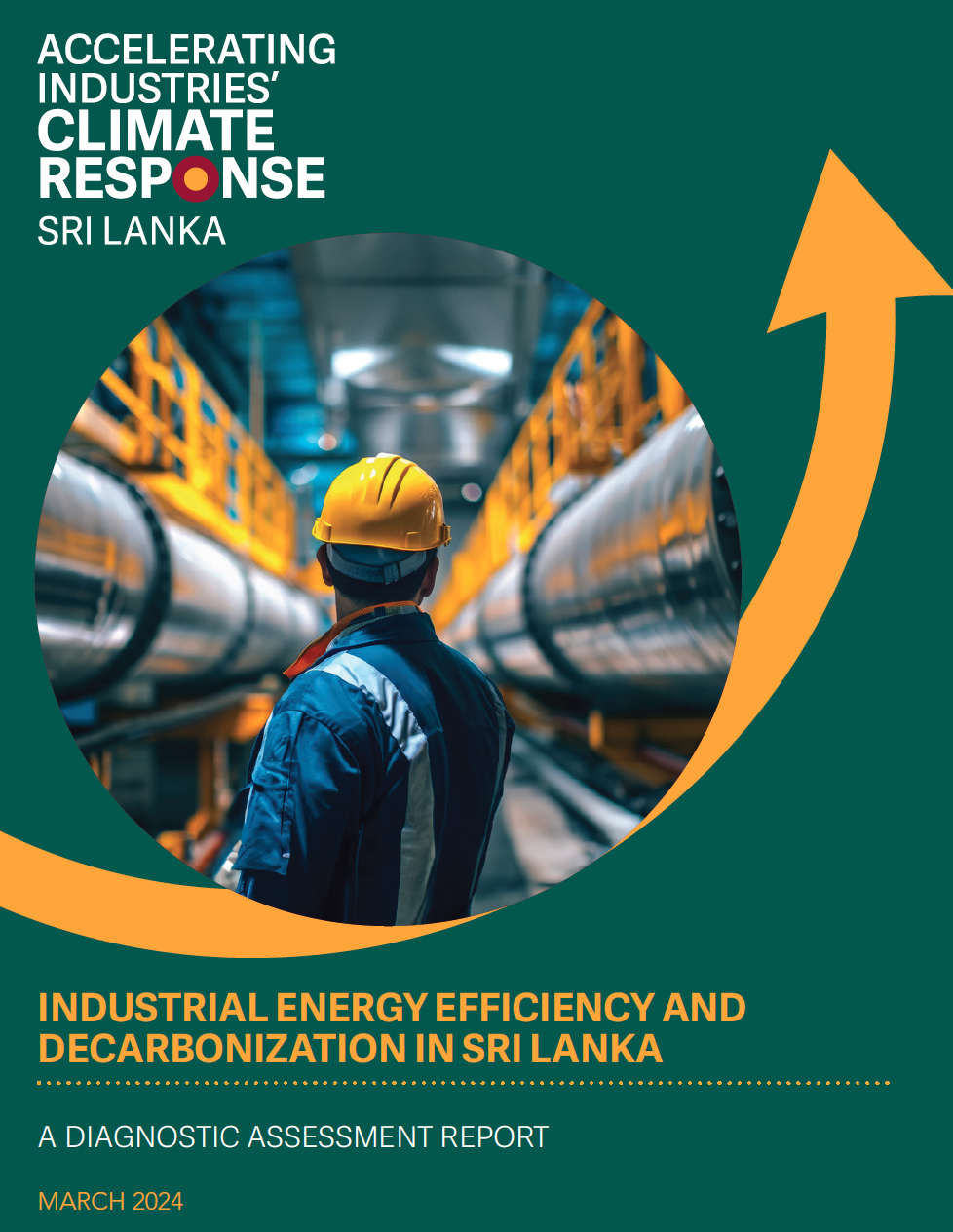Industrial Energy Efficiency and Decarbonization in Sri Lanka
Project team and authors:
Ali Hasanbeigi, PhD (Lead Author) - Global Efficiency Intelligence, U.S
Cecilia Springer, PhD - Global Efficiency Intelligence, U.S.
Sujeewa Fernando - Global Efficiency Intelligence, Sri Lanka
Nicholas Dehod - UNIDO, Vienna
Jagathdeva Vidanagama, PhD - UNIDO, Sri Lanka
Methmali Rajaguru - UNIDO, Sri Lanka
Rashindu Mendis - UNIDO, Sri Lanka
The industry sector in Sri Lanka is a crucial part of the country's socio-economic fabric, contributing significantly to GDP and providing substantial employment to people in Sri Lanka. Similar to many developing nations, Sri Lanka's industrial sector is undergoing rapid expansion and transformation, which has implications for energy use and carbon emissions. These implications pose challenges to the country's energy security and commitment to meeting its Paris Agreement goals outlined in Sri Lanka’s Nationally Determined Contribution (NDC).
In response to this situation, United Nations Industrial Development Organization (UNIDO) is conducted a projected titled “Accelerating Industries' Climate Response in Sri Lanka”. It is a 5-year project funded by the European Union under GCCA+ initiative. The main government counterparts are the Ministry of Industry, the Ministry of Environment, and the Ministry of Power and Energy in Sri Lanka. Global Efficiency Intelligence is one of the technical partners in this project, providing technical expertise and analysis support on industrial decarbonization based on international best practices.
We conducted an analysis of Sri Lanka’s industry sector, particularly focusing on its energy efficiency and decarbonization policies and opportunities. Collaborating with the local partners and ministries, we studied the feasibility of reinforcing NDCs in the industrial sector through various measures. Our findings illuminate the current landscape of policies and regulations related to industrial energy efficiency and decarbonization and highlight the institutional needs and capacity gaps that must be addressed to move Sri Lanka towards its climate goals.
Our analysis shows that the industrial sector in Sri Lanka, inclusive of mining, construction, and manufacturing, has grown substantially from 2000 to 2021. The industrial energy intensity decreased from 2003-2017 but experienced an increase from 2017-2021. In analyzing CO2 emissions, we calculated both electricity- and fuel-related emissions, noting that if biomass is deemed carbon-neutral, associated emissions would not be accounted for. However, the carbon neutrality of biomass is increasingly under scrutiny. To the extent we could obtain data, we analyzed industrial energy use by subsector. In addition, we estimated industrial motor systems’ energy use using various international studies.
There are a range of pressing challenges to industrial decarbonization in Sri Lanka. There's an urgent need for a comprehensive policy framework dedicated to promoting energy efficiency and decarbonization, an effective measurement, reporting, and verification (MRV) system, and a transparent system of data collection and dissemination concerning industrial energy use and emissions. The shortage of a skilled workforce and limited technical knowledge in energy management and sustainable industrial processes pose further impediments. Moreover, the infrastructure deficit and lack of accessible financing mechanisms create barriers to the adoption of energy-efficient technologies.
We also analyzed various energy-efficiency technologies and measures for different industrial motor systems. Using the bottom-up energy-efficiency cost curve model, we estimated cost-effective electricity-savings potentials for each industrial motor systems type in Sri Lanka, separately. We also estimated total technical electricity-savings potentials (what is technologically possible), assuming 100% adoption of series of efficiency measures. Table ES-1 summarizes the energy-saving results.
Table ES-1. Industrial motor systems electricity-savings potential in Sri Lanka in 2021
The share of total technical electricity-savings potential for industrial pump systems compared to total industrial pump systems energy use is 45%. The share of total technical electricity-savings potential for industrial fan systems compared to total industrial fan systems energy use in Sri Lanka is 36%. Furthermore, the share of total technical electricity-savings potential for industrial compressor systems compared to total industrial compressor systems energy use is 39%. The CO2 emissions reduction associated with the electricity-savings potential will help the country to meet its greenhouse gas (GHG) emissions reduction targets.
To achieve the deep decarbonization goal for industry, five industrial decarbonization pillars must be vigorously pursued in parallel: energy efficiency, material efficiency and demand management, electrification, low-carbon fuels, feedstocks and energy sources (LCFFES), and carbon capture, utilization, and storage (CCUS). These industrial decarbonization pillars are explained in more detail in this report.
The report also outlines a set of policy recommendations and action plans to address significant challenges hindering industrial energy efficiency and decarbonization in Sri Lanka. The proposed measures encompass the development of energy standards, innovative funding mechanisms, and target agreements with financial incentives, aiming to accelerate the adoption of decarbonization technologies. Skills and capacity building programs are emphasized to cultivate a proficient cohort of experts, supported by international organizations like UNIDO. The establishment of a robust data collection framework is recommended to track progress, while sector-specific net-zero roadmaps and awareness campaigns are proposed for key industries. A monitoring and evaluation framework is highlighted to ensure program effectiveness, and institutional arrangements, including the formation of a National Industrial Energy Efficiency and Decarbonization Committee, are suggested to facilitate policy formulation and implementation.
We also propose the "Top-100 Energy-Consuming Enterprise Program," a proactive policy proposal aimed at significantly enhancing industrial energy efficiency and decarbonization in Sri Lanka. Drawing inspiration from successful international best practices in both developing and developed countries, the program involves agreements between the government and the top 100 energy-intensive enterprises, establishing targets and commitments over five-year periods. These enterprises are expected to form energy management working groups, conduct energy audits, benchmark efficiency, implement energy management systems, and adopt decarbonization measures. The government's role includes organizing training workshops, providing incentives, and collaborating with international entities for support. Financing mechanisms, information dissemination, and a comprehensive monitoring and evaluation framework further contribute to the program's effectiveness.
Figure ES1. The suggested timeline for design, implementation, and expansion of Top-100 Energy-Consuming Enterprise Program in Sri Lanka



